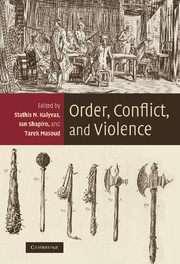Book contents
- Frontmatter
- Contents
- List of figures
- List of tables
- List of contributors
- Preface
- 1 Introduction: integrating the study of order, conflict, and violence
- Part 1 Creating, maintaining, and restoring order
- 2 Probing the sources of political order
- 3 Attaining social order in Iraq
- 4 Factors impeding the effectiveness of partition in South Asia and the Palestine Mandate
- 5 The social order of violence in Chicago and Stockholm neighborhoods: a comparative inquiry
- 6 Traditions of justice in war: the modern debate in historical perspective
- 7 Problems and prospects for democratic settlements: South Africa as a model for the Middle East and Northern Ireland?
- Part 2 Challenging, transforming, and destroying order
- Index
- References
6 - Traditions of justice in war: the modern debate in historical perspective
Published online by Cambridge University Press: 06 July 2010
- Frontmatter
- Contents
- List of figures
- List of tables
- List of contributors
- Preface
- 1 Introduction: integrating the study of order, conflict, and violence
- Part 1 Creating, maintaining, and restoring order
- 2 Probing the sources of political order
- 3 Attaining social order in Iraq
- 4 Factors impeding the effectiveness of partition in South Asia and the Palestine Mandate
- 5 The social order of violence in Chicago and Stockholm neighborhoods: a comparative inquiry
- 6 Traditions of justice in war: the modern debate in historical perspective
- 7 Problems and prospects for democratic settlements: South Africa as a model for the Middle East and Northern Ireland?
- Part 2 Challenging, transforming, and destroying order
- Index
- References
Summary
This chapter will focus on the conflicting traditions of justice in war, traced through the seventeenth to the twentieth century, and is an introduction to the modern debate on justice in war in an historical context. When exploring recent frameworks and conceptualizations of particular types of modern war, such as “unequal war” and “asymmetrical war,” scholars claim to be exploring new phenomena, and draw their evidence from very recent practices of the late twentieth and early twenty-first centuries (MacKenzie 2000, 3). They analyze suicide bombing, acts of terrorism by subnational and religious groups, and other acts that are seen as outside the bounds of traditional warfare. They also look at the responses to these tactics of modern war, such as the aerial bombardment that was practiced during the two Gulf wars, or in Afghanistan, or Falluja, or Gaza (Rodin 2004). But are these practices of war truly modern phenomena? I will demonstrate in this chapter that they are not. By setting out the historical context of the debates concerning the nature of war and concepts of justice in war in the nineteenth century and before, this essay will demonstrate the debate has always been about cases of asymmetrical and unequal wars. War, more often than not, is between an army and a people, not between two professional armies.
- Type
- Chapter
- Information
- Order, Conflict, and Violence , pp. 120 - 138Publisher: Cambridge University PressPrint publication year: 2008



